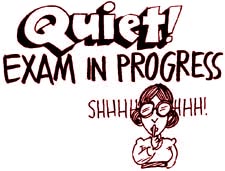Mid-Terminated

This year, a great lift has been taken off of the shoulders of the student body by the removal of midterm week. The notoriously stressful week comprised of panics and late night worrying has vanished, and instead has been replaced with a normal school week. However, many teachers are still having “midterms” that count as a regular test or even as two tests. They are still cumulative and require time to study and review all of the material discussed throughout the year. There is a mixed bag of opinions regarding the new change of midterms.
Last year, Hurricane Sandy eliminated more than a week off of the school year, and the school board decided that it was best to make up for lost class time during midterm week. The new midterm-less format was taken and implemented into this school year as well. Previously, a week was set aside, much like finals week, in which students only came in for a new test each day, and left following its completion. This allowed more study and review time for students to prepare for the next day’s test. Midterms would generally count for 20% of the quarter grade. “ I would never complain about coming into school for only two hours, and if teachers are required to give midterms anyway, having time off would be nice. Like if we’re gonna have midterms in every subject on the same week, it’s borderline unbearable to not have time off to study for each one” says Stephen Imburgia, a junior at Hills West. Nicole Gluckman, a freshman, says “I feel that [formal midterms] are helpful because I re-study everything I might have forgotten.” Even though official midterms no longer exist, many teachers still find it imperative that a cumulative exam be given to reiterate what has been taught in preparation for the finals. And without the rest of the day to study, students have a limited time to prepare for all of their tests.
Many people also find it beneficial to no longer have midterms. Another full week of school allows for more time to cover material, leading to even more time for finals, regents, and AP test review. Mr. Donnelly, an honors math teacher, states “The new format allows for more time spent with classroom instruction while still allowing us to implement a formative assessment”. With this new format, not as much weight is put on review, which means the lack of study time is made up for by the lessening of importance the test holds over your grade.
Personally, I have only experienced midterms my first year in high school. I found them to be stress inducing and relatively arbitrary, as I obviously forgot most of what I reviewed by the time finals rolled around anyway. I agree with the decision to do away with midterm week, as it also gives teachers leeway in terms of how they can approach mid-year review. I also enjoy the prospect of more time to concentrate on review at the end of the year. No matter how you feel about midterm week, its exclusion from this year’s school calendar indicates that the district may be moving away from the traditional week of review exams and test cramming.




